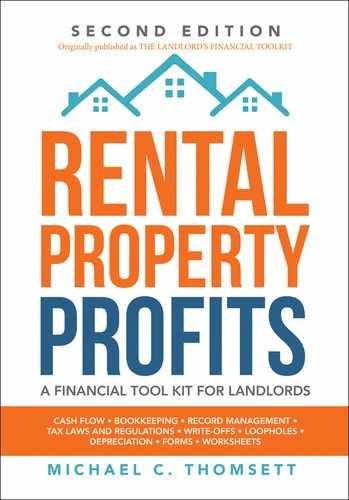INTRODUCTION
WHAT THIS BOOK WILL DO FOR YOU
The nature of real estate investing has changed from the certainty and safety of the past. When the first edition of this book was published in 2005, the real estate world was vastly different than it is today. In that book, statistics from the National Association of Realtors (NAR) showed that the average sales price of new homes had risen almost every year for many years.
Real estate was dependable.
The market for real estate investors was without question a safe and profitable one. It was cited as a safe alternative to investing in the stock market. The numbers look very different today, especially considering the devastating decline in real estate between 2008 and 2015. However, now that this cyclical decline has ended, real estate investing is better than ever. As the coming chapters reveal, the number of renters has increased to an all-time high, meaning greater demand for rental housing. Average rents have increased as a result, even as housing prices have fallen across the country.
By definition, a sound investment is one with low prices and excellent income-generating levels. This describes residential real estate today. And that is the primary focus of this book: the single-family home bought for the purpose of renting it to tenants with several goals in mind:
![]() Rents high enough to pay all or most of the home’s mortgage and other costs
Rents high enough to pay all or most of the home’s mortgage and other costs
![]() Increasing equity value over time, translating to a profitable investment
Increasing equity value over time, translating to a profitable investment
![]() Continued favorable tax advantages in owning rental property
Continued favorable tax advantages in owning rental property
The claim made in the first sentence of the first edition is true once again: Real estate investing is a practical alternative to the stock market for many reasons.
Serious investors may certainly beat inflation and earn profits in the stock market, without any doubt. But having real estate as an alternative does not mean abandoning stocks entirely in favor of rental properties. It does mean expanding an investment portfolio. Real estate is one of the few investments that can generate current income and cover mortgage costs each month, while enabling you to protect the investment through insurance and the maintenance of the property and its value.
The suggestion involves more. As a means for diversifying risks, real estate that is well selected and carefully maintained will gain value over time. Stocks might gain value as well, but there are no guarantees that this will occur. With real estate, the generation of monthly income does not provide such guarantees either, but it does cover the cost of borrowing the money to invest in rental properties.
With the combination of sheltered income and reduced income taxes, the true net cash flow of real estate—when calculated on an after-tax basis—is difficult to beat by any other market, including the stock market, where tax benefits accrue only if you have your shares in a tax-sheltered account such as an IRA or other retirement plan.
It is not a simple process, however. Real estate investing requires you to master tax reporting and filing rules, to set up complete and thorough records, and to establish fair and consistent methods for assigning expenses to properties. This is where this book helps. There is no reason to avoid real estate investments just because the tax and record keeping demands are considerable. You can hire a qualified expert to help with these matters, especially regarding taxes and how they have to be reported and supported with a set of books. However, even when you own several properties at the same time, developing a workable system is not as complex as it might seem. Even without expert help, you can develop an effective system for recording and tracking a range of costs and expenses. Real estate investing involves a large volume of transactions, including supplies to perform maintenance, hiring experts to fix broken systems, payment of utilities, and capital expenditures (buildings, autos and trucks, furniture, and improvements). These also involve calculations of depreciation, which is not as complicated as many people think.
You are not required to become an expert in accounting or tax law to succeed as a real estate investor. However, you probably will need professional help in some areas involved with real estate investing, including developing rental contracts, reporting taxes, and, commonly, the assistance of contractors, appraisers, real estate agents, escrow or legal consultants, and perhaps a management company if you buy properties far from where you live.
This book is not intended as a replacement for the expert advice you need; however, it will help you to become a more informed real estate investor. And the more informed you are, the more likely it is that you will succeed. The only area of expertise you should expect to develop is a focus on investment value, the ability to select good investments with growth potential, and a realistic understanding of supply and demand within the market itself (in terms of property value, rental demand levels, and mortgage lending).
This book breaks down the complexities of property selection, cash flow calculations and planning, and basic real estate bookkeeping. It is set up as a reference guide for anyone wanting to invest in real estate but who is not experienced in tax planning, bookkeeping, depreciation calculations, loss limits under the tax law, and the all-important considerations of finding a lender and working with an appraiser.
